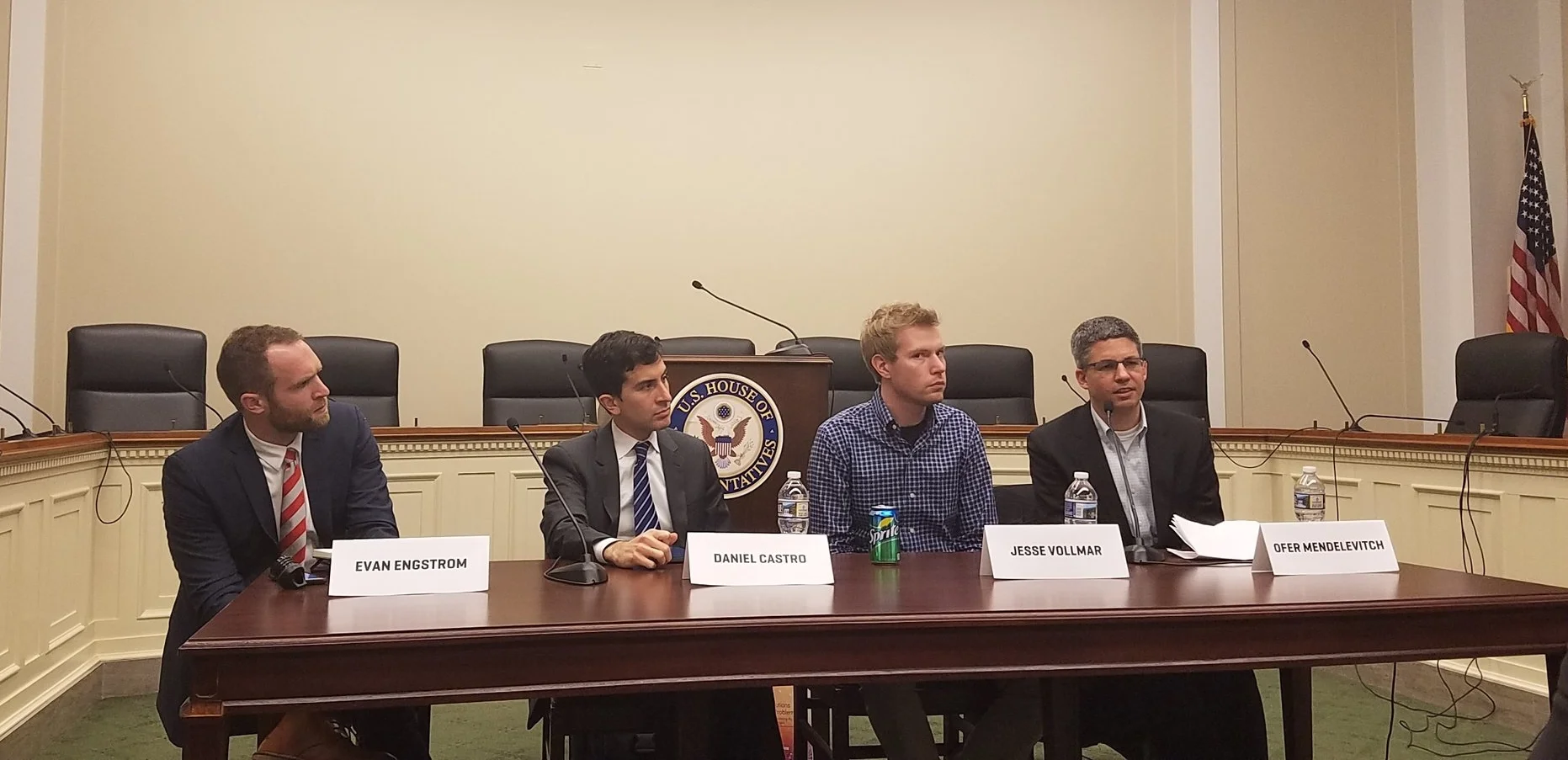Last week, Federal Communications Commission (FCC) Chairman Ajit Pai floated a proposal during a meeting with Internet Service Providers (ISPs) that would roll back the net neutrality rules put in place by the previous Administration and replace them with “voluntary” commitments from ISPs. The proposal would completely undermine the Open Internet Order that the startup community backed in 2015, and Engine has put together a startup letter in conjunction with Y Combinator to push back, telling FCC Chairman Ajit Pai that any efforts to undo net neutrality will threaten startups’ ability to innovate and thrive. Learn more and sign the letter here.
#StartupsEverywhere: Eric Mathews (Memphis, TN)
Startup News Digest: 4/7/17
H-1B season kicked off on Monday, and while the the White House missed the opportunity for a larger overhaul of the program before the lottery opened, the Administration did slip in a few changes at the last minute that have made the already chaotic process of applying for H-1Bs even more frenzied. Late last Friday, U.S. Citizenship and Immigration Services (USCIS) quietly issued a policy memo indicating a more rigorous vetting process for computer programmers. While the changes are mostly cosmetic in nature (USCIS has maintained that the guidance is a clarification of existing policy, not a “policy change”), the agency also announced on Monday that it would be increasing the number of targeted site visits to crack down on H-1B abuse and fraud. The same day, the Justice Department issued a strong warning that employers seeking H-1B visas must not discriminate against American workers. On their own, each of these changes is arguably meant to target outsourcing firms and abuse of the system, not technology companies (most of whom reserve their visas for more complicated, higher paying roles that cannot be filled by U.S. workers). But taken together, they indicate an intentional effort by the President to deliver on his campaign promise to “end forever the use of the H-1B as a cheap labor program, and institute an absolute requirement to hire American workers first for every visa and immigration program.” We’re tracking.
#StartupsEverywhere: Courtney Klein & C'pher Gresham (Phoenix, AZ)
Startup News Digest: 3/31/17
Engine Examines the Limits of Filtering. In a congressional briefing on Tuesday, Engine Executive Director, Evan Engstrom, and Princeton University professor Nick Feamster introduced the report they co-authored exploring various content filtering technologies and the impact that their mandatory application could have on startups. Feamster, a computer scientist, explained the primary modes of filtering and each of their shortcomings in identifying copyright infringing material. Engstrom addressed the implications for startups if policymakers moved to require the use of these technologies. Not only would companies suffer because of the limited ability of the current methods to accurately filter infringing content, he said, but they would also be unable to pay the extremely high price required for full-scale operation of the filtering technology. The full report, which elaborates on the speakers’ remarks, can be found here.
#StartupsEverywhere: Bill Kenney (Connecticut)
Startup News Digest: 3/24/17
Following last year’s dramatic removal of Maria Pallante as Copyright Register, the struggle between Congressional leaders and the Librarian of Congress, Carla Hayden, continues. Despite the fact that Hayden has been clear about her intention to appoint the new Register, (as current law grants her the authority to do), top Republicans and Democrats introduced legislation yesterday that would make the position President-appointed and Senate-confirmed. This shift comes at a time when stakeholders across the board are calling for modernization of the Copyright Office, especially the digitization of records in order to simplify the determination of copyright holders. Members of the House and Senate Judiciary Committees met with Hayden earlier this month in an attempt to hold off on her nomination, however she later wrote them to tell them she planned to move forward with the process in order to ensure an “efficient and effective Copyright Office to serve Congress and the wide variety of stakeholders.” We’re tracking.
Event Recap: Private Solutions for Public Problems
Earlier this month, Engine held its first briefing of the year: a conversation around the ways that startups are harnessing big data to drive innovation and develop targeted solutions for some of society’s greatest challenges. The event was headlined by Reps. Blake Farenthold (R-TX) and Derek Kilmer (D-WA), who were joined by a distinguished panel of startup leaders and policy analysts.
#StartupsEverywhere: Lisa Garner (Jackson, TN)
Startup News Digest: 3/17/17
A federal judge in Hawaii issued a freeze on President Trump’s new immigration ban on Wednesday, just hours before it was scheduled to take effect. Two weeks ago, President Trump signed the revised immigration ban, which narrowed the scope of the original ban to six countries and removed some of the most contentious aspects in an attempt to satisfy the courts. However, U.S. District Judge Derrick K. Watson was not convinced, arguing that “a reasonable, objective observer...would conclude that the Executive Order was issued with a purpose to disfavor a particular religion.” Almost 60 technology companies signed an amicus brief supporting the state of Hawaii in its suit against the federal government. The decision by Watson is probably not the final word, as the Justice Department will likely appeal the ruling and continue to fight for the ban over the coming months.
#StartupsEverywhere: Scott Resnick and Sara Woldt (Madison, WI)
Startup News Digest: 3/10/17
Engine released a report on Wednesday highlighting the ways in which startups are capitalizing on Big Data to solve some of society’s biggest challenges. The paper also offers insights for policymakers seeking to foster innovation and social transformation while maintaining sufficient protections for the American public. To celebrate the report’s publication, Engine hosted a briefing on Capitol Hill, which was headlined by Reps. Blake Farenthold (R-TX) and Derek Kilmer (D-WA). They were joined by a distinguished panel of policy analysts and startup leaders from ITIF, FarmLogs, and LendUp. Panelists explained how the convergence of multiple datasets is really what drives insights, even more than the size of a single dataset. The also argued that the data generated and shared by the government should be high quality, interoperable, and widely available to entrepreneurs.
In Apple v. Samsung, SCOTUS Sided With Reason Over Rounded Corners
After almost five years of legal volleying, the U.S. Supreme Court finally issued a decision in the highly anticipated Apple v. Samsung design patent case late last year. On Tuesday, Dec. 5, the court delivered a unanimous decision in favor of Samsung, finding that damages for design patent infringement may be limited to revenues attributable to a component of an article of manufacture rather than profits from the entire article. While this is an important victory for startups and innovators—from global corporations to inventors toiling in garages—courts must still work to provide the guidance and clarity necessary to prevent bad actors from abusing the patent system to the detriment of innovation. And they have a new opportunity to do so: On Feb. 7, the U.S. Court of Appeals for the Federal Circuit took a significant step in that direction by remanding the Apple v. Samsung case to the Northern District of California court.
#StartupsEverywhere: Kyle Ashby (Santa Barbara, CA)
Startup News Digest: 3/3/17
Prioritizing Broadband in Infrastructure Package. During his State of the Union address to Congress on Tuesday, President Trump promised to invest $1 trillion in infrastructure. While the speech did not include specifics about what would be included in the initiative or how it would be funded, many are hopeful that broadband investments will be prioritized (including more than 60 mayors and local leaders who signed onto a Next Century Cities letter urging the President and Congressional leadership to include broadband in any infrastructure effort). As we have argued before, the millions of Americans who still lack access to quality broadband represent potential users and entrepreneurs who are cut off from the opportunities that connectivity provides. We’re tracking.
#StartupsEverywhere: Darius Graham (Baltimore, MD)
Research: The Limits of Filtering
Startup News Digest: 2/24/17
Very, Very Strange Times at Uber. Uber was thrown into a human resources and public relations nightmare this week after Susan Fowler, a former engineer at the ride-sharing giant, published a damning blog post recounting sexism, sexual harassment, and administrative negligence during her time at the company. The lack of diversity in the technology industry is well-documented, and while top executives at most Silicon Valley companies (including Uber) have acknowledged the problem and pledged to fix it, accounts like Fowler’s call into question whether those pledges are merely talk. The company’s CEO Travis Kalanick responded to the post by calling for an “urgent investigation” into the allegations, and tapped former Attorney General Eric Holder, board member Arianna Huffington, and the company’s Chief Human Resources officer, Liane Hornsey to lead the probe. However, some have called this approach into question, noting that the three individuals selected are all company insiders. Policymakers on the Hill have also responded to the story, calling on tech companies to do more to embrace diversity. Only time will tell how Uber will recover from this crisis, but in the meantime, there’s always Lyft.
#StartupsEverywhere: David Tominsky (Cedar Rapids, IA)
Startup News Digest: 2/17/17
Congress Talks Self-Driving Cars. As autonomous vehicles increasingly move from the realm of science fiction to literally hitting the pavement, policymakers are grappling with a broad range of issues presented by these new technologies, including safety, security, liability, and ethics. On Tuesday, Congress had the opportunity to dive deeper on some of these topics, as the House Energy & Commerce Committee’s Digital Commerce and Consumer Protection subcommittee convened a hearing on self-driving vehicles that included panelists from GM, Toyota, Volvo, Lyft, and the RAND Center for Decision Making Under Uncertainty. The participating industry giants called on Congress to relax existing safety regulations, such as the requirement that any vehicle have both a steering wheel and floor pedals, which they argued currently limit innovation. They also noted that the existing patchwork of state laws was stifling growth (Lyft called out California’s proposed laws in particular) and urged policymakers to do more to explicitly limit the ability of states to legislate on this emerging technology. To coincide with the hearing, several members highlighted efforts to improve regulatory flexibility for the industry (including potential legislation from Sens. John Thune and Gary Peters), and there will most certainly be more to come.


























